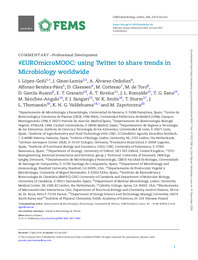Título :
#EUROmicroMOOC: using Twitter to share trends in Microbiology worldwide |
Autor :
López-Goñi, Ignacio 
Giner-Lamia, J.
Álvarez-Ordoñez, A.
Benitez-Paez, Alfonso
Claessen, D.
Cortesao, M.
de Toro, M.
García-Ruano, D.
Granato, E. T.
Kovács, A. T.
Romalde, J. L.
Sana, T. G.
Sánchez Angulo, Manuel
Sangari, F. J.
Smits, W. K.
Sturm, T.
ThomassinL., J.
Valdehuesa, K. N. G.
Zapotoczna, M. |
Editor :
Federation of European Microbiological Societies |
Departamento:
Departamentos de la UMH::Producción Vegetal y Microbiología |
Fecha de publicación:
2019-06-20 |
URI :
https://hdl.handle.net/11000/34208 |
Resumen :
Twitter is one of the most popular social media networks that, in recent years, has been increasingly used by researchers as a platform to share science and discuss ongoing work. Despite its popularity, Twitter is not commonly used as a medium to teach science. Here, we summarize the results of #EUROmicroMOOC: the first worldwide Microbiology Massive Open Online Course taught in English using Twitter. Content analytics indicated that more than 3 million users saw posts with the hashtag #EUROmicroMOOC, which resulted in over 42 million Twitter impressions worldwide. These analyses demonstrate that free Microbiology MOOCs shared on Twitter are valuable educational tools that reach broad audiences throughout the world. We also describe our experience teaching an entire Microbiology course using Twitter and provide recommendations
when using social media to communicate science to a broad audience.
|
Palabras clave/Materias:
social networks
Twitter
science communication
open access
MOOC |
Área de conocimiento :
CDU: Ciencias puras y naturales: Biología: Microbiología |
Tipo de documento :
info:eu-repo/semantics/article |
Derechos de acceso:
info:eu-repo/semantics/openAccess
Attribution-NonCommercial-NoDerivatives 4.0 Internacional |
DOI :
https://doi.org/10.1093/femsle/fnz141 |
Aparece en las colecciones:
Artículos - Producción vegetal y microbiología
|
 La licencia se describe como: Atribución-NonComercial-NoDerivada 4.0 Internacional.
La licencia se describe como: Atribución-NonComercial-NoDerivada 4.0 Internacional.
.png)
